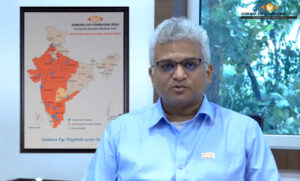Industry Titans Applaud Union Budget 2024-25 as a Game-Changer for Economic Resurgence
Mr Himanshu Baid, Managing Director, Poly Medicure Ltd. Union Budget 2024: Strengthening Healthcare for a Resilient India We welcome the Union Budget's focus on healthcare, which marks a pivotal step towards enhancing healthcare accessibility and quality in


Mr Himanshu Baid, Managing Director, Poly Medicure Ltd.
Union Budget 2024: Strengthening Healthcare for a Resilient India
We welcome the Union Budget’s focus on healthcare, which marks a pivotal step towards enhancing healthcare accessibility and quality in India.
Finance Minister’s proposed changes in customs duty aimed at synchronizing domestic capacity addition for X-ray tubes and Flat panel detectors is worthy. This measure will bolster local manufacturing capabilities in medical technology, fostering self-reliance and enhancing accessibility to critical diagnostic equipment.
Furthermore, the exemption of basic customs duty on three cancer treatment medicines is a commendable step towards improving affordability and availability of essential treatments. This initiative aligns with our commitment to advancing healthcare outcomes through innovative solutions.
The government’s initiatives to strengthen India’s healthcare infrastructure and accelerate growth in the pharmaceutical & medical device sector represent a significant leap towards sustainable development and innovation in healthcare. Overall, the Union Budget’s healthcare provisions set a positive tone for the sector’s growth and development, reinforcing our optimism for the future of healthcare in the country.
………………………………………………………………………………………………………………………………………………

Dr Minnie Bodhanwala, CEO of Wadia Hospitals
The recent budget announcement has brought a sense of relief and hope for cancer patients and the healthcare sector as a whole. The allocation of ₹89,287 crore for healthcare and the exemption of three more cancer medications from customs duties are heartening moves towards making healthcare more accessible and affordable.
While the budget could have done more to address the critical issue of funding for healthcare, the increased allocation and reduced custom duty on cancer medicines are steps in the right direction. India’s healthcare spending still lags behind global standards, and key issues like healthcare workforce development, medical education, and universal health coverage remain unaddressed.
However, the emphasis on promoting public-private partnerships, encouraging domestic manufacturing of medical supplies through the PLI scheme worth ₹2,143 crore, and expanding the Ayushman Bharat scheme with an increased allocation of ₹7,500 crore are welcome moves. These initiatives will help make healthcare more accessible and affordable, a crucial step towards achieving the vision of a $5 trillion economy.
As India strives to become a $5 trillion economy, the healthcare sector will play a vital role. The budget has taken some steps towards supporting this vision, including the allocation of ₹4,108 crore for the Pradhan Mantri Ayushman Bharat Health Infrastructure Mission and ₹1,100 crore for biotechnology research and development. However, sustained efforts and investments will be necessary to address the complex challenges facing the sector.
The exemption of three more cancer medications from customs duties will bring relief to thousands of patients and their families, making life-saving treatments more affordable. This decision is a testament to the government’s commitment to making healthcare more accessible and affordable.
Overall, while the budget is a mixed bag, the increased allocation for healthcare, reduced custom duty on cancer medicines, and incentives for manufacturing in India are steps in the right direction. We hope this will be followed by continued efforts to make healthcare a fundamental right, rather than a privilege.
………………………………………………………………………………………………………………………………………………

AiMeD hails Union Budget-2024; will give a boost to overall economic growth
: Rajiv Nath
–Thankful to the GoI for reducing duty on import of components of X-ray equipment
–Medical devices industry was expecting more for quality and affordable healthcare: AiMeD Forum Coordinator Rajiv Nath
New Delhi, July 23, 2024: The Association of Indian Medical Device Industry (AiMeD) on Tuesday hailed the Union Budget-2024 presented by Finance Minister Nirmala Sitharaman in the Parliament today, as visionary and progressive, which will give a boost to the country’s overall economic growth.
In a statement, AiMeD Forum Coordinator, Rajiv Nath said: “The Union Budget-2024 is visionary and progressive. It will give a boost to the country’s overall economic growth. It reflects the determination of Prime Minister Shri Narendra Modi to realize the goal of a US $ 10 trillion economy by 2030 and Viksit Bharat by 2047.”
Mr Nath said: “Nine priorities of the government – productivity and resilience in agriculture; employment and skilling; inclusive human resource and development, and social justice; manufacturing services; urban development; energy security; infrastructure; innovation and research and development; and next generation reforms – will act as a catalyst for the country’s overall economy.”
Talking about the medical device industry vis a vis the Union Budget-2024, Mr Nath said: “We are thankful to the GoI for the reduction in duty on the import of components of X-ray equipment until these get to be produced in India. This enables continuity in investment in efforts to become a manufacturing hub of x-ray equipment globally.”
Mr Nath said that in a representation to Arunish Chawla, Secretary, DoP, dated January 19, 2024, AiMeD had raised the issue of increase in custom duty and removal of benefits for import of x-ray tube and flat panel detector under the Phased Manufacturing Programme (PMP). Since there are no domestic manufacturers available for these two critical components, the relief from the government is appreciable, added Mr Nath.
“We at AiMeD had, however, been hoping that the recommendations of Department of Pharmacy (DoP), which were backed by DGHS, would have helped on nominal duty increase on at least those medical devices that India had substantial manufacturing capacity as demonstrated during Covid-19 pandemic times,” said a despondent but hopeful Rajiv Nath.
“During Covid-19 pandemic, Indian medical devices showed its resilience in manufacturing syringes, masks, oximeters, oxygen concentrator and certain testing kits while the so-called world leaders were caught unawares. Removal of nil duty exemption on some of these medical devices would have acted as a further enabler for Make in India drive and enhance our global competitiveness,” added Nath.
It is worth mentioning that in a Pre-Budget memorandum, AiMeD had urged Finance Minister Sitharaman to consider a strategic hike in customs duty on medical devices to a nominal 10-15 per cent to foster a more balanced trade environment, encouraging domestic manufacturing and reducing reliance on imports, which currently still constitutes a staggering 70 per cent of the sector.
“The imports of medical devices are consistently over Rs 61,000 crore for the last three years and regretfully this year have increased by 13 per cent to Rs 69,000 crore,” said Nath, while flagging the issue of prevailing inverted duty structure.
To address this, AiMeD has proposed the implementation of a 5 per cent health cess on custom duty for the remaining medical devices as this was earlier applied to a limonite’s medical devices and this health cess was used to fund resources for Ayushman Bharat.
Another pivotal aspect highlighted by AiMeD was the necessity for trade margin capping.
“By monitoring the Maximum Retail Price (MRP) of imports, the Government will curb the excessive mark-ups often seen in the market. This measure will make medical devices more affordable and accessible to the Indian populace, ultimately benefiting public health as consumers are affected not by import duty protection as much as by artificially inflated MRP of medical devices,” he said.
Referring to one of the core focusses of National Medical Devices Policy-2023 to reduce import dependence by 70 per cent and make India a global manufacturing hub of medical devices, Mr Nath said that the Central government must also consider income tax benefits, specifically tailored for capital expenditure (CAPEX) and research and development (R&D) investments within the medical devices sector.
“Such fiscal incentives are crucial for fostering innovation, enhancing production capabilities, and propelling India towards self-reliance in medical technology,” he said, adding that AiMeD suggestions are not just about immediate economic adjustments but are a strategic blueprint aimed at revitalising India’s medical device industry with huge global competitiveness potential and a rising export graph of 32000 Cr last year .
………………………………………………………………………………………………………………………………………………

Anjan Bose, Founding Secretary General
This was being termed a Budget of Hope. FM’s announcements point towards focus on growth, job creation, skilling, youth, MSMEs, digital infrastructure, green energy, fiscal prudence, incentivising states…Abolition of Angel tax for all classes of investors should have growth-enabling impact on start-up ecosystem including that of Healthcare especially HealthTech segment…For Healthcare sector, there were positive announcements on import duty rationalization for some cancer medicines and medtech items like X-ray tube and flat panel detector…there were many asks from the sector like on Ayushman Bharat pricing, GST rationalisation, overall budget allocation for Healthcare sector etc…so we have to wait for the details with the fine prints to come out.
……………………………………………………………………………………………………………………………………………..

Dr Rajiv Chhibber, Joint Coordinator AIMED
The Navratna’s (Nine) Priority Areas of Agriculture, Employment, Inclusive Development, Manufacturing and Services, Urban Development, Energy, Infrastructure, Innovation and R&D, and Next Generation Reforms coupled with a boost towards sustainability, education, skilling, employment and greater emphasis on Ease of Doing Business will certainly provide the necessary fillip to the economy and chart course for transforming India into ‘Viksit Bharat’ by 2047. The focus on Cancer drugs renews the criticality of NCDs especially cardiovascular disease and related disorders for which India can be a critical partner with quality manufacturing already happening in country. This is opportune and significant against the backdrop of rising disease demographic dividend and the rapidly changing healthcare needs globally, ensuring that India can be a quality manufacturing hub and a key exporting nation when it comes to medtech.
……………………………………………………………………………………………………………………………………………..

Union Budget 2024: A Progressive Leap Towards Economic Resilience and Innovation by Mr. Gaurav Agarwal, Managing Director, Innvolution Healthcare Pvt. Ltd
The Union Budget 2024-2025 has been unveiled as a comprehensive roadmap for India’s economic future, reflecting a strong commitment to fostering growth, enhancing competitiveness, and ensuring inclusive development. The budget addresses critical sectors, including manufacturing, healthcare, MSMEs, and infrastructure, with measures designed to propel India towards its goal of becoming a $5 trillion economy.
Strengthening Domestic Manufacturing and Innovation
One of the standout features of the budget is its emphasis on boosting domestic manufacturing, particularly in the Medtech sector. By reducing customs duties on X-ray tubes and flat panel detectors, the government is paving the way for enhanced local production and reduced dependency on imports. This move is aligned with the “Make in India” initiative and making India Atmanirbhar in the highly import-dependent X-ray segment, expected to attract investments, encourage technological advancements, and create high-quality jobs within the country.
Furthermore, the introduction of a dedicated fund for research and innovation in the pharmaceutical and Medtech sectors underscores the government’s commitment to transforming India into a global hub for medical technology. This initiative is poised to drive R&D activities, fostering an ecosystem of innovation and technological excellence.
Empowering MSMEs and Boosting Employment
The budget introduces significant reforms to support the MSME sector, a critical engine of economic growth and employment. Enhanced credit guarantees and increased Mudra loan limits will provide much-needed financial support to small businesses, enabling them to expand and thrive in a competitive market. The new assessment model for MSME credit is expected to streamline processes, ensuring timely access to capital and fostering entrepreneurship across the nation.
Additionally, the government’s focus on skill development and employment generation is evident in its ambitious plan to upgrade Industrial Training Institutes (ITIs) and align vocational training with industry needs. By targeting 20 lakh youth for skill development over five years, the budget aims to equip the workforce with the skills necessary to excel in emerging sectors, addressing the demand-supply gap in the labor market.
Infrastructure Development as a Growth Catalyst
Infrastructure development remains a cornerstone of the Union Budget 2024, with significant investments in industrial corridors and urban development projects. The development of twelve industrial parks under the National Industrial Corridor Development Programme and the Amritsar Kolkata Industrial Corridor are set to enhance industrial output, attract foreign direct investment, and create employment opportunities across regions.
These infrastructure initiatives are expected to facilitate seamless connectivity, reduce logistical costs, and enhance the competitiveness of Indian industries on the global stage. By prioritizing infrastructure, the budget not only addresses immediate economic needs but also lays the foundation for sustained growth and prosperity.
Fostering Social Inclusion and Economic Equity
The budget’s commitment to social welfare is evident in its substantial allocations for schemes benefiting women, marginalized communities, and rural development. With over ₹3 lakh crore allocated for women-centric schemes, the government is taking decisive steps towards enhancing female workforce participation and promoting gender equality.
Furthermore, the Pradhan Mantri Janjatiya Unnat Gram Abhiyan aims to uplift tribal communities, improving their socio-economic conditions and ensuring inclusive growth. These measures reflect a holistic approach to development, ensuring that the benefits of economic growth reach all segments of society.
Conclusion
The Union Budget 2024-2025 is a visionary document that addresses the diverse needs of the Indian economy, setting the stage for a resilient and self-reliant future. By focusing on key sectors such as manufacturing, healthcare, MSMEs, and infrastructure, the budget paves the way for sustainable growth, innovation, and social equity.
As the industry embraces these initiatives, there is optimism about the transformative potential of this budget in driving India’s economic resurgence. With strategic investments and forward-looking policies, the Union Budget 2024 is poised to accelerate India’s journey towards becoming a global economic powerhouse.
………………………………………………………………………………………………………………………………………………

Mr Sunil Khurana, CEO & MD – BPL Medical Technologies
The Union Budget 2024, presented by our FM earlier today, presented several forward-looking proposals steering India’s economic growth. However, as the CEO & MD of BPL Medical Technologies as well as one of the members of the Indian MedTech Industry, I find myself contemplating the short-term and long-term implications of the budget, specifically on the medical device industry, with a combination of cautious optimism and unmet expectations.
A notable point mentioned in the budget is the changes in basic customs duty. This change under the Phased Manufacturing Programme, reduced customs duty from 15% to 5% for some of the components required in X-ray machines and flat panel detectors, a move that will certainly aid in our efforts to provide premium quality equipment. The government’s decision to provide relief in this area is a welcome move to maintain synchronicity with domestic production. In addition, the focus on skill development and R&D funding will boost local production and position India as a global leader in healthcare manufacturing. The new scheme for internships in 500 top companies for 1 crore youth over 5 years will create a huge difference, resulting in a highly skilled workforce and fostering innovation. We are optimistic that this will accelerate the research and innovation initiatives in the medical device industry.
While the budget rightfully prioritises several areas, its direct implication on the medical devices, however, seems limited. The specific measures that could have significantly boosted our sector were not addressed. For instance, an increase in customs duty on medical devices, a move which rightfully could’ve encouraged domestic manufacturing and reduced our dependency on import, was not addressed.
In conclusion, the union budget certainly holds potential but falls short of providing the much-needed push to the medical device sector. It is my humble urge to the government to consider strategic measures that will not only support but also significantly enhance the growth and global competitiveness of the Indian medical device industry.
………………………………………………………………………………………………………………………………………………

Dr Azad Moopen, Founder & Chairman, Aster DM Healthcare
With 66% of the Indian population still under the age of 35 and an estimated 7-8 million youth entering the job market annually, Union Budget 2024-25 provides a much-needed impetus to advancing employment opportunities and youth upskilling, supported by focus on comprehensive development for the country. Although healthcare did not seem to have a major focus this time, it is promising to see the 12.5% hike in budget allocation for the sector at Rs. 89,287 crores as compared to the last Budget.
In a period of maintaining the status quo, the government is taking bold strides with initiatives outlined in the Interim Budget 2024, including the establishment of new medical colleges, the promotion of vaccines for cervical cancer, expanded maternal and child care schemes, and the innovative “You Win” platform for immunisation.
Additionally, the proposed reduction in customs duties on X-ray tubes and flat panel detectors for domestic X-ray machine production, alongside the exemption of three cancer medicines from customs duty, marks a significant relief for cancer patients nationwide. This progressive budget underscores a commitment to fostering inclusive growth within the healthcare sector, striving to bridge the rural-urban divide and ensure equitable access to essential services.
…………………………………………………………………………………………………………………………………………….

Bharath Balasubramaniam, President – Operations & Administration, Sankara Eye Foundation India
“The Union Budget has provided measures that will bolster the healthcare industry by promoting affordability, accessibility, and self-reliance in medical technology and treatments. The announcement of the changes in the Basic Customs Duty (BCD) on x-ray tubes and flat panel detectors for use in medical x-ray machines will provide advanced diagnostic tools at more competitive prices, leading to improved diagnostic services and patient outcomes. Operationalizing the Anusandhan National Research Fund will support basic research and prototype development in healthcare, fostering the creation of innovative treatments and advanced diagnostic techniques. Increased R&D funding will improve patient outcomes and drive private sector investment in healthcare solutions. Enhanced research and innovation will develop advanced healthcare infrastructure, address pressing health challenges, retain top talent, and boost India’s global competitiveness in healthcare. The focus on women and youth empowerment through skill enhancement opportunities will also help bridge the talent gap in the healthcare sector,”
………………………………………………………………………………………………………………………………………………

Dr. Krishna Prasad Vunnam | Founder and Managing Director,Ankura Hospital For women & children
Given the rapidly rising cancer cases in India, the initiative to promote cervical cancer vaccination among girls aged 9-14 marks a momentous turning point that has been declared in the budget. The government is stressing on the need for timely prevention and health awareness among young girls and their families. This move will empower future generations with the knowledge they require to prevent cervical cancer. By increasing accessibility to the HPV vaccine, it is possible to address misconceptions and stigma related to cervical cancer. Preventive measures are encouraged for girls to lead healthy lives. Likewise, the launch of the Unorganised Worker Identification Number (U-WIN) platform is a significant leap with a focus on immunization management and the ambitious Mission Indradhanush. By streamlining vaccine distribution through real-time data tracking, U-WIN will ensure that the vulnerable populations are able to get timely vaccinations which will reduce the burden on the healthcare system. Overall, we are extremely satisfied with the budget allocations given to the healthcare system. We hope to see a significant change and advocate affordable and accessible healthcare for every section of society. Together, we can make a difference and strive toward improving the health of the nation with more such crucial initiatives.
………………………………………………………………………………………………………………………………………………

Mr. Uday Deshmukh, Founder & Chairman, Onco Life Cancer group of Hospitals
Exemption of three cancer treatment drugs – Trastuzumab deruxtecan, Osimertinib and Durvalumab from basic customs duty is a great initiative by the Government to provide custom duty exemptions on a few Cancer medications. With Cancer cases growing exponentially every year, it is an important starting step towards Affordable Healthcare. Hopefully, in the near future, the government will be able to provide custom duty exceptions/relief on most Cancer Medications for the benefit of the patients. We are happy and satisfied with the important decision taken by the government in the public interest.”
………………………………………………………………………………………………………………………………………………

Saransh Chaudhary, President, Global Critical Care, Venus Remedies Ltd and CEO, Venus Medicine Research Centre:
The Central government’s decision to exempt three more cancer medicines from customs duty is a commendable step towards making cancer drugs more affordable. It will also make oncology exports more competitive and incentivise manufacturers by reducing their costs. We also welcome the Finance Minister’s announcement to include manufacturing & services and innovation, research & development among the nine priority areas identified by the government to ensure fast-paced growth in line with its vision of “Viksit Bharat”. Pharma manufacturing being India’s strength, we expect the government to build on it with its incentive-based approach. A renewed focus on innovation and R&D, on the other hand, will transform India into a value-driven economy, unleashing its immense potential wealth creation potential.
……………………………………………………………………………………………………………………………………………..

Mr. Suraj Pratap Malik, Whole-Time Director
This Budget has been formulated against the backdrop of an uncertain global economy characterized by elevated asset prices, political uncertainties and shipping disruptions. India has, however, emerged as a bright spot with 7 per cent GDP growth and 4 per cent inflation.
With an accent on employment, skilling, MSMEs, and the middle class, this budget has the following 9 priorities:
1) Productivity and resilience in Agriculture
2) Employment & Skilling
3) Inclusive Human Resource Development and Social Justice
4) Manufacturing & Services
5) Urban Development
6) Energy Security
7) Infrastructure
8) Innovation, Research & Development and
9) Next Generation Reforms
In a welcome move, the FM announced that the fiscal deficit is estimated at 4.9 per cent of GDP in FY 25 and will drop further to 4.5 per cent by FY 26.
There are elements of both change and continuity in the FM’s seventh consecutive budget. But this budget also marks the first budget of Modi 3.0. The FM has done well in adroitly balancing the requirements of various sectors and the macroeconomy and has taken the right call to advance the pursuit of Viksit Bharat effectively.
………………………………………………………………………………………………………………………………………………

Mr Ganesh P Sabat, CEO – Sahajanand Medical Technologies Ltd & Co-Chair FICCI Medical Devices Committee
The Union Budget 2024 by Finance Minister Nirmala Sitaraman a crucial step towards ensuring India’s continued economic growth and development in the next 5 years to come as we inch towards achieving the Sustainable Development Goals by 2030. The ‘Nine Priority Areas’ — Agriculture, Employment, Inclusive Development, Manufacturing and Services, Urban Development, Energy, Infrastructure, Innovation and R&D, and Next Generation Reforms are well curated to boost infrastructure development, create employment opportunities, and reduce the urban-rural divide while promoting digitalization, Health-tech benefits and stimulating economic growth in the manufacturing industry with an emphasis towards Research and Innovation. The announcement of 12 new industrial parks under the National Industrial Corridor, focusing on creating integrated zones, is expected to significantly revise manufacturing growth whilst meeting the rising job demands through the transformative boost in the education sector. From the MedTech industry, while we go through the final nuances and allocations in the budget document, however the focus on cancer care drugs, puts back to flash the need for India to do more towards Non-Communicable Diseases (NCDs) especially when it comes to areas like cardiac care where India is inching to become the disease capital globally. This will not only motivate us to sustain innovation but will also attract more investments in research and development of newer product therapies ensuring patient safety, better outcomes and give a boost to the Made-in-India for the World as we set our goals towards ‘Viksit Bharat’ 2047.
………………………………………………………………………………………………………………………………………………

Mr. Shiwang Suraj, Director & Founder
“We commend the government’s robust focus on the housing sector in this year’s budget. The substantial allocation of ₹10 lakh crore under the PM Awas Yojana Urban 2.0 is a game-changer. This initiative will not only address the housing needs of 1 crore urban poor and middle-class families but also stimulate the real estate market, creating vast opportunities for developers and homebuyers alike. The inclusion of an interest subsidy to facilitate affordable housing loans is particularly welcome, as it will make homeownership more accessible to many.
Additionally, the emphasis on rental housing through dormitory-type accommodations in PPP mode is a strategic move. It will provide much-needed housing solutions for industrial workers, fostering a more inclusive housing market. This initiative will also encourage the private sector to invest in rental housing projects, further expanding the housing supply,
………………………………………………………………………………………………………………………………………………

Dr Jagprag Singh Gujral, SVP MDO/ Head of Emerging Markets, Varian (a Siemens Healthineers Company) and Group CEO- CTSI
“We commend the government’s proactive steps in exempting three additional medicines from customs duty for cancer patients. This decision will alleviate a significant portion of the financial burden faced by patients and their families, making life-saving treatments more accessible.
The BCD changes for domestic capacity addition for medical technology items like X-ray tubes and flat panel detectors is a crucial step towards self-reliance and enabling access to care in cost conscious, underpenetrated market.
The thrust on MSME domestic manufacturing and abolishing Angel Tax will incentivise healthcare startups provide the foundation for enabling technology led innovations in the life sciences domain.
We are optimistic that these measures aim to strengthen the healthcare infrastructure and the Government’s commitment to improving healthcare accessibility and affordability is evident in the announcements. We look forward to collaborating with all stakeholders to ensure these benefits reach those in need.”
………………………………………………………………………………………………………………………………………………

Dr. Mandeep Singh Basu, Director, Jagat Pharma
“The emphasis on facilitating term loans to MSMEs through the new credit guarantee scheme is appreciated. This initiative is immensely beneficial as it offers essential collateral-free loans, greatly improving credit access for MSMEs. This budget marks a significant advancement towards fostering growth and resilience within the MSME sector.
New and small businesses often lack sufficient collateral to avail loans, and collateral-free loans remove this barrier, allowing more businesses to access the funds they need to grow and operate. By offering credit-free loans, the government is encouraging entrepreneurship and the establishment of new businesses. We are confident that these initiatives will positively impact the sustainability and development of businesses nationwide.”
………………………………………………………………………………………………………………………………………………

Saumyajit Roy, CEO & Co-Founder, Emoha
“The Budget 2024’s focus on boosting women’s workforce participation through hostels, creches, and skilling programs is commendable. The ‘sandwich generation’ of women, balancing childcare and elder care, often sacrifice careers due to these responsibilities. At Emoha, we believe incorporating senior care as an employee benefit is the missing piece of this puzzle. By addressing senior care, we can unlock the full potential of women in the workforce. The encouraging 17.2% rise in net female additions to the workforce in May 2024 could see exponential growth with this approach.
We call on corporations to partner with senior care providers like Emoha. This not only aligns with the government’s gender diversity goals but also creates a truly inclusive work environment. As we look to the future, integrating senior care into employee benefits will be crucial in achieving the workforce participation and economic growth targets set by this budget.
Emoha stands ready to collaborate with businesses to implement these solutions, ensuring that the budget’s vision for women’s empowerment is fully realized. This holistic strategy will be key to building a more balanced, productive, and inclusive economy in the years to come.”
………………………………………………………………………………………………………………………………………………

Vikram Vuppala, Founder & Group CEO, NephroPlus – Asia’s Largest Dialysis Centre Network
“We were hoping that the healthcare sector would be granted infrastructure status in this budget along with an increase in healthcare expenditure which is less than 2.5% of GDP. But we welcome the government’s commitment to skill development, with a promise to upskill 20 lakh youth over the next five years and a month’s wage for new hires. This initiative will significantly boost employability and address the skill gap in various sectors.”
………………………………………………………………………………………………………………………………………………

Harish Trivedi, CEO, CTSI – South Asia
“We applaud the government’s decision to exempt three additional medicines from customs duty for cancer patients. This move will significantly relieve cancer patients by making essential treatments more affordable and accessible. The proposed changes in customs duty on X-ray tubes and flat panel detectors for domestic X-ray machine production are also commendable. These measures will not only benefit patients but also enhance the overall healthcare infrastructure in the country. Such forward-thinking policies are crucial in our collective fight against cancer and improving patient outcomes.”
……………………………………………………………………………………………………………………………………………..

Mr. Ashok Jayanthi, Chairman & Co-founder, Hosachiguru,
Training and enabling 1 crore farmers in natural farming, along with certification and branding support, is a commendable step towards ecological sustainability. Moreover, the establishment of 10,000 bio-input resource centers across the country will provide essential bio-inputs on a constant basis. This initiative will significantly reduce the financial burden on farmers by offering cost-effective and eco-friendly alternatives. Together, these measures will greatly support the farming community, fostering sustainable agricultural practices and enhancing the overall agricultural ecosystem.
………………………………………………………………………………………………………………………………………………

Mr. Sanjaya Mariwala – President of IMC Chamber of Commerce and Industry and Executive Chairman & Managing Director
“The 2024 Union Budget aligns with our expectations, prioritising infrastructure, skill development, and job creation. It places an emphasis on rural development, recognising the diverse needs of India’s economic landscape.
Agriculture takes centre stage with initiatives for climate-resilient crops and increased MSPs, aiming to boost farmer incomes and stability. A groundbreaking Rs 1 lakh crore fund for private-sector research positions India to compete globally and potentially replace China as a primary market in certain sectors.
With a focus on stimulating consumption, boosting employment, and creating a favourable environment for both domestic and foreign businesses, the budget sets the stage for sustainable economic growth.
Overall, a balanced budget presenting a comprehensive strategy for India’s development, addressing critical needs in agriculture, research, and infrastructure. An approach that has the potential to propel India towards a more competitive and prosperous future on the global stage.”
………………………………………………………………………………………………………………………………………………






